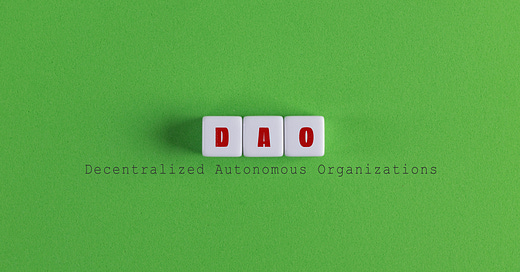Decentralized Autonomous Organizations: The Future of Business and Beyond
Discover the World of DAOs and How They Could Disrupt Traditional Business Models and Change Our Daily Lives
A Decentralized Autonomous Organization, or DAO, is a type of organization that operates using self-executing smart contracts on a blockchain network. Simply put, it is a type of organization that is run entirely by code and operates without a central authority or hierarchy.
The concept of DAOs dates back to the early days of cryptocurrency. In 2013, Vitalik Buterin, the co-founder of Ethereum, published a white paper outlining the idea of a "decentralized autonomous corporation." This idea quickly gained traction and, in 2016, the first DAO was launched on the Ethereum platform.
Since then, DAOs have become an increasingly popular way to run decentralized organizations and projects. They have the potential to disrupt traditional business models by allowing anyone to participate and contribute to the organization. Because they are decentralized, there is no need for a central authority or hierarchy, which means that anyone can participate and have a say in the decision-making process.
One of the main benefits of DAOs is their transparency. Because they are run on a blockchain, all transactions and decision-making processes are recorded and open for anyone to see. This level of transparency is something that is often lacking in traditional organizations, where decisions can be made behind closed doors and certain stakeholders may have more influence than others.
However, DAOs have not been without their challenges. One high-profile example of a failed DAO is The DAO, which launched in 2016. The DAO raised over $150 million in its initial coin offering (ICO), making it the largest crowdfunding campaign in history at the time. However, a few months later, a hacker exploited a vulnerability in the smart contract and drained around $50 million worth of ether from The DAO. This event caused a rift in the Ethereum community and led to the creation of Ethereum Classic, a separate blockchain.
Despite the failure of The DAO, there have been several successful DAOs as well. One example is MolochDAO, a decentralized organization that was created to fund Ethereum infrastructure projects. MolochDAO has raised over $2 million and has funded several successful projects, including the development of the Ethereum Virtual Machine (EVM).
So, how could DAOs potentially change our daily lives and shape the future? It's hard to say exactly, but they have the potential to revolutionize the way we think about traditional organizations and the way we interact with them. In the future, it's possible that DAOs could be used to run everything from small businesses to large corporations, allowing for greater decentralization and transparency in the way these organizations are run.
For example, imagine a world where ride-sharing platforms are run by DAOs. These platforms would be decentralized, meaning there would be no central authority or hierarchy controlling them. This could potentially lead to more competition and lower prices for consumers. DAOs could also potentially be used to run decentralized energy grids, allowing for a more efficient distribution of resources.
In conclusion, DAOs are a promising new technology that have the potential to change the way we think about traditional organizations and the way we live our daily lives. While they have faced some challenges, such as the failure of The DAO, there have also been several successful examples, like MolochDAO. As the technology behind DAOs continues to evolve, it will be interesting to see how they shape the future.




